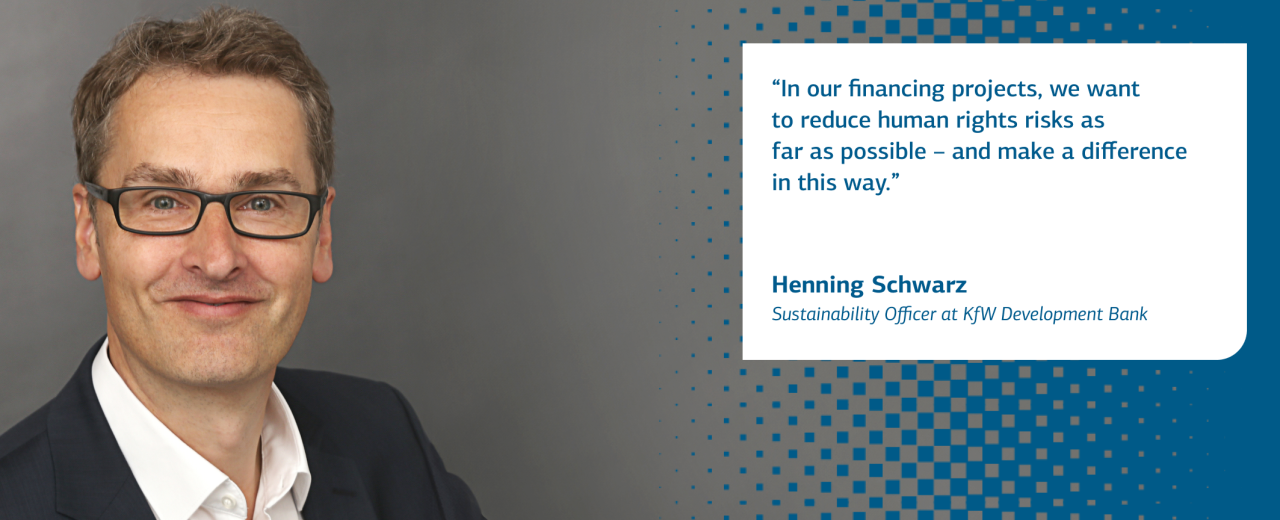Tip: Activate javascript to be able to use all functions of our website
Despite growing attention, human rights violations are still widespread in global supply chains. Against this backdrop, KfW Development Bank has launched the “Voluntary Level of Ambition in Supply Chains” initiative – also known by its German acronym FALKE. The objective is to strengthen and further develop the human rights due diligence in the bank’s financing projects.
KfW wants to improve economic, environmental and social living conditions around the world. KfW’s Human Rights Declaration describes the approach and thus defines the framework for KfW Development Bank’s work to improve human rights due diligence. In its projects, it also follows international standards when it comes to environmental protection and social sustainability requirements – above all those of the World Bank. KfW Development Bank’s Sustainability Guideline also sets out principles for dealing with environmental, social and climate aspects.
In Germany, the Supply Chain Act has been in force since 1 January 2023. This does not formally affect KfW Development Bank’s financing. Furthermore, the coalition agreement of the new German Federal Government sets out the repeal of the Supply Chain Act and its replacement by the national law implementing the upcoming European Corporate Sustainability Due Diligence Directive (CSDDD). Nevertheless, KfW Development Bank is committed to taking due diligence obligations into account in the supply chains of goods and equipment in its projects. This is why KfW Development Bank has established FALKE. Henning Schwarz, Sustainability Officer at KfW Development Bank, explains exactly what this initiative is all about in an interview.

FALKE is the German acronym for “Voluntary Level of Ambition in Supply Chains (Freiwilliges Ambitionsniveau in Lieferketten)”. This is exactly what we want to define and shape with regard to human rights due diligence obligations – because we don't want to wait until we are affected by any legal requirements. The aim of the initiative is to further develop and strengthen human rights due diligence in financial cooperation. Because it is our desire to live up to our claim to be a bank committed to responsibility. This also includes reducing human rights risks in our financial development cooperation and in our projects that we implement worldwide in our partner countries and using our scope for action so that supply chains of goods and equipment in our projects can be designed to be as socially acceptable as possible – and in this way make a difference.
In the analysis phase, we examined the extent to which we already voluntarily apply recommendations and requirements of international standards and laws in the area of human rights due diligence in our financing activities. As a result, our existing measures – including environmental and social impact assessments, for example – already meet many of the requirements of the relevant international standards and rules and regulations. However, we were able to identify potential for improvement with regard to the structured identification and mitigation of human rights risks.
We also made a comparison with five other bilateral and multilateral development banks. We found that our peers have different approaches to integrating human rights due diligence. This benchmarking helped us identify best practices and develop our existing approaches.
First, we prioritised the recommendations resulting from the analysis and discussed them in depth. Three questions were ultimately key to the selection and development of measures: What contribution does the measure make to strengthening human rights due diligence obligations? Is the measure practically feasible in the context of financial cooperation? And are there already successful and proven practical examples from other development banks that we can use?
We have developed ten measures that we will develop and test by 2026. These range from the development of a tool for improved screening of human rights risks to the adjustment of our Sustainability Guidelines and specific training for employees on human rights due diligence in our financial cooperation projects.
One highlight is a pilot measure in which we are focusing on projects that affect the supply chains of photovoltaic projects. This is because they are particularly affected by human rights risks. In addition, other development banks and the solar industry are already striving to improve transparency in the supply chains of photovoltaic systems. As part of this measure, we want to identify our possibilities to indirectly contribute to improvements.
We are striving for continuous development. We will therefore regularly check the effectiveness of the measures to be implemented. If the aforementioned pilot measure is successful in the supply chains of photovoltaic projects, we plan to extend it to other projects. We want to use the findings to further optimise our approach.
As a bank, we have no direct contractual relationship with the suppliers and construction firms that implement the projects. Therefore there are fewer opportunities to exert influence. Nevertheless, we want to use our framework of action in a way that reduces human rights risks and makes supply chains as socially acceptable as possible.
Within the framework of FALKE, it is important to us above all that we can continue to manage our daily task – financial cooperation. We cannot simply delay projects by several years to carry out supply chain studies, for example. Instead, we need to act on a timely and risk-based basis. At the same time, we must recognise that there are certain limits. Supply chains are as complex as they are, as each supplier has its own supply chain. That is why we focus on the areas where we see the biggest levers and drivers. This is the only way we can achieve effective improvement.

Share page
To share the content of this page with your network, click on one of the icons below.
Note on data protection: When you share content, your personal data is transferred to the selected network.
Data protection
Alternatively, you can also copy the short link: https://www.kfw.de/s/ennB6XpY
Copy link Link copied